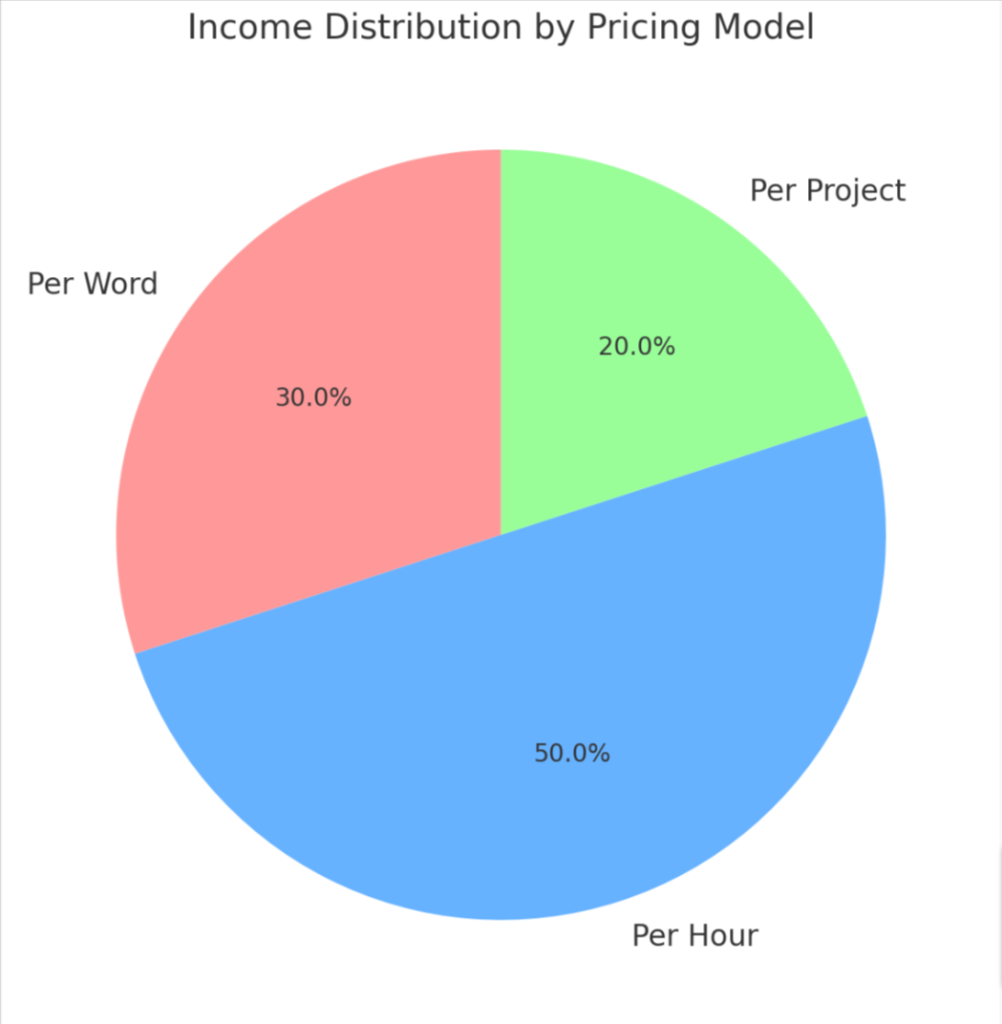Deciphering Freelance Writing Rates: What’s Best for You?
Navigating the world of freelance writing rates can feel like venturing into a maze without a map. Did you know that charges can vary widely – from per word, per hour to even per project? This article is your beacon, illuminating the pros and cons of these different pricing models and offering strategic advice on setting your own rates.
Ready to decode this puzzle?.
Key Takeaways
- Freelance writers can charge per word, per hour, or per project.
- Per word pricing provides clarity and fairness, but may not account for research time or value to the client’s business.
- Per hour pricing allows flexibility and ensures payment for each hour worked, but accurate tracking is necessary.
- Per project pricing offers budgeting clarity but requires careful estimation of work requirements.
- Factors such as experience level, type of writing and client, complexity and deadline, and desired income impact freelance writing rates.
- Social proof through testimonials and working with credible companies can boost a writer’s reputation.
Pros and Cons of Different Pricing Models for Freelance Writing
Per Word Pricing allows freelance writers to get paid based on the number of words they write. This pricing model is advantageous because it provides a clear measurement of work and ensures that writers are fairly compensated for their efforts.
However, it can also be limiting as it doesn’t account for the time and effort put into research or revisions. Additionally, clients may try to negotiate lower rates per word, leading to potential income loss for writers.
Per Word Pricing
Per word pricing is one of the most common ways that freelance writers charge for their work.
| Pros | Cons |
|---|---|
| Easy to calculate and straightforward to understand. | Can lead to underpricing if the article requires extensive research or revisions. |
| Ensures the writer is paid for every word produced. | May discourage clients who require large amounts of content. |
| Offers consistency and predictability for both writer and client. | Does not account for the time spent on non-writing tasks like researching, interviewing, or editing. |
| Allows for adjustments based on the complexity of the topic or the writer’s expertise. | Does not consider the value of the content to the client’s business. |
In per word pricing, the writer sets a price for each word they write. This approach provides a clear and quantifiable way to measure the amount of work done. However, it may not accurately reflect the time and effort put into the project, especially for complex assignments that require significant research or revisions.
This pricing model may also discourage potential clients who need large volumes of content but have a limited budget. While it offers consistency and predictability, per word pricing doesn’t consider the value that the content brings to the client’s business.
Per Hour Pricing
Freelance writers often charge per hour when they have a clear understanding of the time it will take to complete a specific task.
| Pros | Cons |
|---|---|
| Allows for flexibility in terms of time spent on a project. | Clients may be hesitant to agree if they feel the project will take a long time. |
| Ensures payment for each hour worked, reducing the risk of undercharging. | Requires accurate tracking and reporting of hours spent on a project. |
| Can be advantageous for longer, more complex projects. | Not ideal for quick tasks as it may end up being less profitable. |
Factors such as the nature of the project, the writer’s experience, the complexity of the project, and the deadline can significantly impact the per hour rate. It is crucial for freelance writers to evaluate these factors carefully before setting their hourly rate.
Per Project Pricing
Freelance writers often use per project pricing for large tasks or those that require extensive research and writing skill.
| Pros | Cons |
|---|---|
| Allows for a comprehensive understanding of the total cost upfront, providing budgeting clarity for both client and freelancer. | Estimating the amount of work a project needs can be difficult and may result in undercharging or overcharging. |
| Greater flexibility in terms of work schedule as the focus is on the end product, not the hours spent. | If the project scope changes without a revision in price, it may lead to extra unpaid work. |
| Can be more profitable if the writer is efficient and completes the project faster than anticipated. | Risk of spending more time on the project than initially planned, reducing the hourly wage. |
To effectively use this model, writers should have a clear understanding of the project requirements and be able to accurately estimate the time and effort it will take. This model is best suited for experienced writers who can reliably project their workload.

Factors to Consider When Setting Freelance Writing Rates
When setting freelance writing rates, there are several factors to consider. These include the time and resources required for the project, your experience level as a writer, the type of writing and client you are working with, the complexity and deadline of the project, and your desired income.
Time and Resources
Freelance writers need to carefully consider their time and resources when setting their rates. This includes assessing how much time they will need to dedicate to each project, as well as the research and materials required.
By evaluating the demands of a project and understanding their own capacity, freelance writers can determine fair rates that compensate them for their expertise and effort. It’s important for writers to value both their time and the resources they invest in producing high-quality work, ensuring that they are adequately compensated for their efforts.
Experience Level
Experienced freelance writers often have the advantage of being able to command higher rates. Clients are willing to pay more for writers who have a proven track record and can deliver high-quality work consistently.
With each project they complete, experienced writers gain valuable skills and knowledge that make them more efficient and effective. This means they can produce quality content in less time, ultimately earning a higher hourly rate.
Additionally, their experience allows them to provide valuable insights and recommendations to clients, adding further value to their services. As freelance writers gain more experience, they become better equipped to handle complex writing assignments across different industries and niches.
As for beginner freelance writers with limited experience, it’s important not to undersell oneself but also not to overprice services too early on in one’s career. Instead of charging premium rates right from the start, beginners might consider offering slightly lower prices as an incentive for clients to give them a chance.
This provides an opportunity for beginners to build up their portfolio while gaining practical experience working with real clients and meeting deadlines.
Type of Writing and Client
The type of writing and the client you are working with can greatly impact your freelance writing rates. Different types of writing require varying levels of skill, expertise, and research.
For example, webpage content may be less complex compared to technical or academic writing. Similarly, the client’s requirements and expectations also play a role in determining your rates.
Some clients may have specific guidelines or demands that require additional time and effort on your part. Understanding the nature of the writing project and considering the needs of your client will help you determine a fair rate for your services.
Complexity and Deadline
Complexity and deadline are important factors to consider when setting freelance writing rates. The more complex the project and the tighter the deadline, the higher the rate should be.
Writing technical webpages or articles that require in-depth research and knowledge will naturally take more time and effort compared to simple blog posts. Similarly, if a client needs a project completed within a short timeframe, you may need to prioritize their work over other projects, which also justifies charging a higher rate.
By taking into account complexity and deadline in your pricing decision, you can ensure fair compensation for your expertise and time.
Desired Income
Determining your desired income is a crucial factor to consider when setting your freelance writing rates. It’s important to have a clear understanding of how much money you want or need to make from your writing services.
This will help you set realistic goals and ensure that you’re earning enough to support yourself financially. When determining your desired income, take into account factors such as living expenses, taxes, and any financial goals you may have.
By knowing the amount of money you want to earn, you can confidently price your services and negotiate with clients to reach your income targets.
Boosting Your Writing Experience with Social Proof
Showcasing results on your website can help boost your writing experience with social proof.
Testimonials from Clients
Client testimonials are an effective way to boost your freelance writing career. They provide social proof and credibility to your work, helping potential clients trust in your abilities. Here are some tips for using testimonials effectively:
- Collect testimonials from satisfied clients: Reach out to your past clients and ask for their feedback on your work. Ask them to highlight specific results or benefits they experienced from working with you.
- Showcase testimonials on your website: Create a dedicated page on your website to showcase the positive feedback you’ve received. Use quotes or excerpts from client testimonials, along with their name and company, to add authenticity.
- Highlight testimonials in pitches and proposals: When submitting proposals or reaching out to new clients, include a section that highlights positive feedback from past clients. This can help build trust and increase the likelihood of securing new projects.
- Use testimonials in marketing materials: Incorporate client testimonials into your marketing materials such as brochures, flyers, or social media posts. This can help potential clients see real-life examples of the value you provide.
- Update testimonials regularly: As you complete new projects and receive additional positive feedback, make sure to update your testimonial collection regularly. This ensures that potential clients see recent and relevant feedback.
Writing for Credible Companies
Writing for credible companies can enhance your freelance writing experience and boost your reputation. Here are some ways to achieve this:
- Seek out well-known companies: Look for established brands or reputable organizations that require written content for their websites, blogs, or social media platforms.
- Research the company’s values: Before pitching your services, make sure the company aligns with your own values and goals. This ensures a better fit and increases your chances of being accepted as a writer.
- Showcase previous work with credible companies: If you have previously written for respected companies, highlight these projects on your portfolio or website. This provides social proof and builds trust with potential clients.
- Network within the industry: Attend industry conferences or join professional associations related to the type of writing you specialize in. Building connections with professionals in the field can lead to referrals or direct job opportunities.
- Build a strong online presence: Having an active presence on social media platforms such as LinkedIn, Twitter, or Medium can help you establish yourself as a credible writer. Share valuable insights, engage with relevant communities, and participate in conversations within your niche.
Showcasing Results on Your Website
You can showcase your writing skills and accomplishments on your website to attract potential clients and build credibility. Here are some ways to do it:
- Display a portfolio of your best writing samples.
- Highlight any awards or recognition you have received for your work.
- Include testimonials from satisfied clients or employers.
- Provide case studies that demonstrate the success of your writing projects.
- Showcase any published articles, blog posts, or other content you have written.
- Share relevant statistics or data that demonstrate the impact of your writing.
- Include links to any websites or publications where your work has been featured.
Consistently Raising Your Freelance Writing Rates
Regularly evaluate and adjust your rates, build a strong reputation, and continue to improve your skills! Keep reading to learn how you can increase your freelance writing rates over time.
Regularly Evaluating and Adjusting Rates
Regularly evaluating and adjusting your freelance writing rates is crucial for staying competitive in the industry and ensuring you are appropriately compensated for your work. Here are some steps to help you make necessary rate updates:
- Research market trends: Stay updated on current market rates and industry standards for freelance writing services.
- Assess your skills and experience: Consider how your skills and experience have grown since you last set your rates. Have you gained any new certifications or completed additional training?
- Evaluate demand and workload: Consider the demand for your services and how busy you are with projects. If you’re consistently booked, it may be time to increase your rates.
- Analyze client feedback: Pay attention to client feedback, especially if they consistently praise the quality of your work. This can be a good indicator that you should consider raising your rates.
- Adjust based on financial goals: Regularly assess whether your current rates align with your desired income goals. If necessary, make adjustments that reflect the value of your services.
Building a Strong Reputation
Building a strong reputation is crucial for freelance writers looking to consistently raise their rates. One way to do this is by delivering high-quality work and exceeding client expectations.
Consistently meeting deadlines and communicating effectively with clients will also help to build trust and credibility. Additionally, actively seeking feedback from clients and incorporating it into future projects can demonstrate a commitment to improvement.
Another strategy for building a strong reputation is to establish yourself as an expert in your niche by publishing articles, guest posting on reputable websites, or speaking at industry events.
Continuing to Improve and Expand Your Writing Skills
To become a successful freelance writer, it is important to continuously improve and expand your writing skills. Here are some ways you can enhance your abilities:
- Take writing courses or workshops in areas that interest you.
- Read books and articles on different writing styles and techniques.
- Practice writing regularly to develop your voice and hone your skills.
- Seek feedback from peers or mentors to improve your work.
- Stay updated with industry trends and changes in writing conventions.
- Experiment with different genres or types of writing to broaden your expertise.
- Network with other writers and learn from their experiences.
- Attend conferences or events related to writing to gain new insights and knowledge.
Conclusion
In conclusion, understanding the different pricing models for freelance writing is essential for both writers and clients. Whether it’s per word, per hour, or per project, each model has its pros and cons.
Factors such as time and resources, experience level, type of writing and client, complexity and deadline, and desired income should be considered when setting freelance writing rates.
By consistently evaluating rates, building a strong reputation, showcasing social proof through testimonials and credible companies worked with, and continuing to improve skills, freelance writers can steadily raise their rates.

